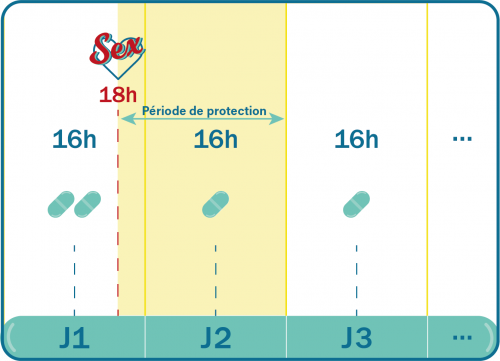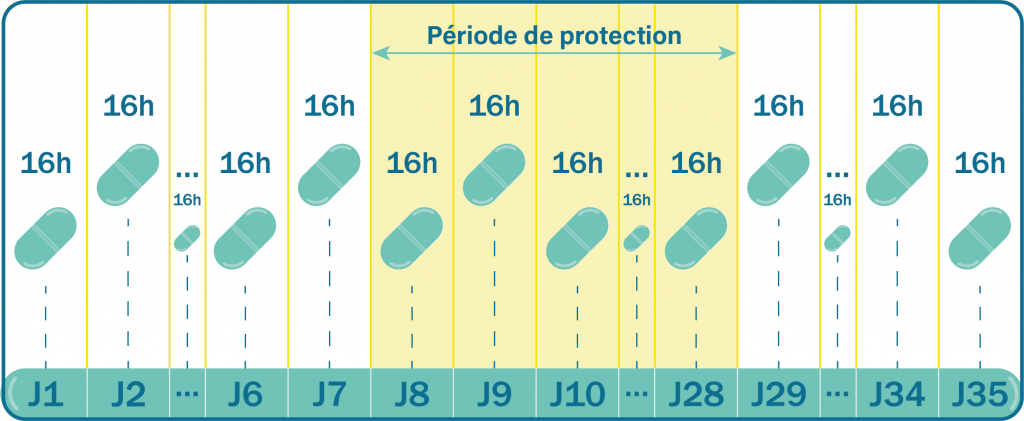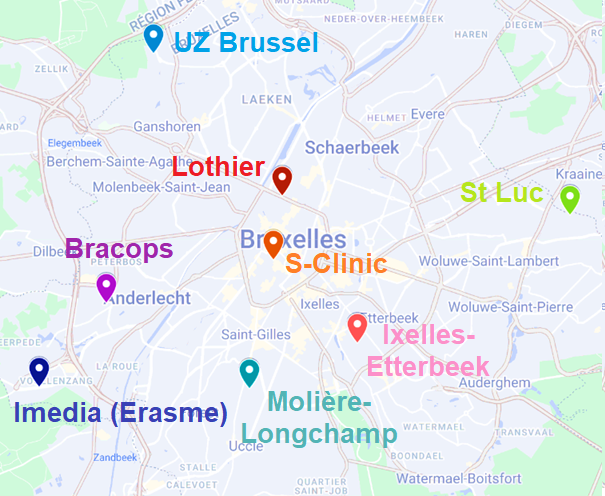PrEP (pre-exposure prophylaxis) can be a powerful tool in reducing the chances of HIV infection in at-risk groups. When taken as prescribed, it is up to 99% effective at reducing infection.
But despite being a major defence against HIV infection, the treatment remains inaccessible to many in Belgium – particularly the expat community. PrEP can be prohibitively expensive without the right health insurance, prescription, or doctor’s reference meaning that for at-risk groups the risk of exposure can rise significantly.
The Brussels Times alongside French-speaking sexual health platforms Exaequo and the Platform for the Prevention of AIDS (Plateforme Prévention SIDA) has created a guide for men who have sex with men (MSM) on how to access this important sexual health treatment.
What is PrEP?
PrEP is the generic name used for any medication used to prevent infection in people who have not yet been exposed to a virus. In this context, PrEP refers to medicine that can help prevent infection by HIV, the virus responsible for AIDS.
First approved in 2012, the most common form of PrEP for HIV is a tenofovir/emtricitabine combination pill, more commonly known by its brand name Truvada. In Belgium, it is typically sold in its generic format. Other treatment variants such as emtricitabine/tenofovir alafenamide (Descovy) may also be occasionally prescribed. Bi-monthly injectable variants are currently in development.
The WHO considers PrEP to be an effective way of preventing HIV infection and began recommending it in 2015. Those who first start the treatment may experience “start-up syndrome”, which usually involves mild nausea, headache, or stomach troubles, but these symptoms typically go away quickly.
Some studies have expressed concern that the medicine may cause mild declines in kidney function in over-50s, but this is typically supervised by the prescribing doctor and the risk is generally negligible.
Who can take PrEP?
PrEP is a relatively expensive treatment. As such, it is typically made available to groups that are most at risk of contracting HIV. Eligibility laws will vary by country but in Belgium patients must:
- Be HIV negative (seronegative)
- Be over 16
- Have sex without protection and be considered at a high risk of getting HIV. This can include:
- Be a man who has sex with men and/or
- Be a transgender person and/or
- Come from a country which has a high prevalence of HIV and/or
- Be a sexworker and/or
- Inject drugs and/or
- Be HIV negative in a relationship with someone who is HIV positive with an unsuppressed viral load
AND have at least one of these individual risk factors:
- Have had penetrative sex with at least two different partners in the last six months and/or
- Have had at least two sexually-transmitted infections (STIs) in the last six months and/or
- Have used post-exposure prophylaxis (PEP) several times and/or
- Partake in chemsex (sex under the influence of methamphetamine or other drugs) and/or
- Have physical risk factors (bleeding, injuries, etc)
According to these criteria, some monogamous men who have sex with men, or other queer people, may not be eligible. But anyone interested in the treatment is advised to talk with a healthcare professional.
“PrEP doctors go through thorough counselling and evaluate with patients their risk of getting HIV and reasons to want PrEP. Many patients do not strictly fit in the categories,” explains Valentin Blaison, project lead at Exaequo.
According to the health platform, the majority of people in Belgium who use PrEP are gay or bisexual men (men who have sex with men), but users also include transgender women and black cisgender women.
“The general message is that any person who thinks that they’re at risk of HIV should at least seek information and consider that option, especially gay/bi men, black people, and transgender people. White cisgender straight people have a very low percentage of getting HIV and doctors will probably discourage them from using PrEP.”
How to take PrEP?
The way that PrEP is prescribed will be different depending on the patient's exact case and circumstance. Firstly, this is different for cis men than for other groups.
“Cis men can use ‘event-based’ PrEP only for when they think that they have sex. They must take it at least two hours before sex and once a day for two days after sex. Or they can take it daily and be protected at all times. They take two doses the first day, they’re protected after two hours, and then they take one pill a day,” Blaison explains.

"Event-based" protection allows for protection in the event of sexual activity. Two pills are take 2 hours before sex, followed by one each day for two days following intercourse. Credit: La Plateforme Prévention Sida
Cis women or transgender people (if they use hormones) must instead take one pill a day from the first day and will only be protected after seven days. The first week doesn’t offer 100% protection.
For cisgender people, the penis, mouth, and rectum are protected within two hours if people take two pills. The vagina is protected after one week of daily PrEP, one pill a day. If a cis woman only does anal sex, she can use event-based PrEP. For transgender people, if they use hormones, it is recommended to use daily PrEP.
The major difference between event-based PrEP and daily PrEP is that a person on a daily PrEP course can miss a pill with no serious consequences whereas with event-based PreP the residual level of protection is lower, meaning that if a patient takes one pill then forgets the two follow up pills, they risk contracting HIV.

Daily PrEP use offers longer and stronger protection. Missed doses are not as serious when taking regular pills. Credit: La Plateforme Prévention Sida
Importantly, PrEP should not be a replacement for condoms but rather in conjunction with existing safe sex practices. PrEP will not stop you from contracting other STIs. This is not to say that many MSM use it this way.
Where can I get PrEP?
There are several ways to access PrEP. Not all are so easy, and for some expats this process can be significantly more complicated than for locals.
In Belgium, PrEP must be prescribed by doctors and cannot be bought over the counter in a pharmacy. In order to be fully reimbursed, it should be prescribed by a doctor at an HIV reference centre. Increased use of PrEP in Belgium has resulted in wait times of up to three months to see this specialist. This poses problems for some patients seeking access to the drug.
“Many doctors don’t even know that PrEP exists, how it works, and for whom. This can even result in misinformed doctors mistakenly refusing people the treatment,” warned Thierry Martin, director of the Platform for the Prevention of AIDS.
Martin recommends interested patients to call around HIV reference centres to try to get an appointment but acknowledges that this can take time, although waiting times are falling.
In Brussels, wait times at Imedia near Erasme metro station, Polyclinique Lothierand near Yser metro station, and the St Luc hospital offer appointments within 7-10 days, according to Exaequo. At UZ Brussel, Bracops, Moliere, and Ixelles wait times are around 4-6 weeks. At St. Pierre’s S-clinic, the waiting list is around 3 months.

Credit: Exaequo
There are around a dozen reference centres in Belgium, with other centres existing in major cities such as Antwerp, Namur, and Charleroi.
Outside these reference centres, the AIDS platform director warns that the knowledge of many Belgian doctors about PrEP is limited and that GPs knowledgeable about this treatment tend to be queer themselves and located in major cities. This poses problems for people wanting to access treatment in more rural locations.
“Not all GPs are familiar with PrEP,” Blaison agrees. Exaequo is working on a list of doctors who are knowledgeable about the treatment and is planning new training sessions for GPs on the preventative treatment.
Why is PrEP difficult to access for some expats?
Many expats attempting to access the treatment quickly run into barriers, notably regarding their residency status, insurance policy, or budget.
Good news: if you are employed by the European Institutions, PrEP is covered by your private insurance policy, sometimes even without reference from an HIV reference clinic. This is also the case for many expats on international contracts and a private insurance policy.
At the same time, some of those on private (foreign) policies do not have coverage. This forces patients to assume the whole cost for themselves. As previously stated, PrEP (Truvada or any other brand) is very expensive.
A breakdown of the total cost is as follows:
- €47 for an HIV specialist visit
- €100 for lab tests
- Around €270 for a box of 90 pills of PrEP. For daily use, this will last three months.
If you do not have medical insurance in Belgium, it may be worth purchasing the pills in a neighbouring country. With a Belgian prescription, the 90 pack of pills costs, just a few dozen euros in Germany or the Netherlands.
“We see a lot of EU citizens who live, study, or work in Belgium but keep their home insurance for various reasons, and sometimes don’t even register at a commune. For them, it’s difficult. They can theoretically get refunded using the European Health Insurance Card (EHIC) but most people don’t know how to use it,” Blaison said.
Even if uninsured foreigners can get their PrEP treatment refunded by some means, the cost is often simply too high to bear. This is often too expensive for students, the experts note, and may even discourage some at-risk people from pursuing a treatment which protects their health.
Related News
- Sale of preventative anti-HIV drug PrEP explodes in Belgium
- HIV infections up by 4% in Belgium last year
“They can register at the commune, which can take months, and then to a Belgian mutualité, and then access PrEP like any Belgian citizen, but the procedure is long and many patients don’t have the motivation.”
Undocumented people in Belgium face the most significant hurdles. Many come from high-risk countries for HIV and would benefit greatly from the treatment. Their options, however, are limited. These people can try to urgently access treatment through CPAS, Fedasil, or some select charities.
The request for treatment may be refused, but local organisations will help asylum seekers or people in irregular situations fight this decision. A dedicated network of activists attempts to ensure supply to all those who seek treatment.
I’m insured in Belgium; how much does PrEP cost?
Good news! If you are registered at your local commune, possess a valid residency card or national ID number, and are signed up with a Belgian health insurance provider, you can access PrEP, at a massively discounted rate (after getting a reference from an HIV clinic).
The maximum cost of this is set at €15 for a box of 90 tablets, more than 18 times less than if you pay out of pocket. This does not include the added price of follow-up medical tests and consultations, which typically take place every three months.
Many Belgians now regularly take PrEP. According to figures published by the Sciensano Public Health Institute, around 5,000 people were undergoing PrEP treatment in Belgium at the end of 2021.
Where can I find information in English about PrEP?
For more information about PrEP in English, interested parties can visit the English version of the Exaequo website here. A dedicated website run by the Platform for the Prevention of AIDS on how to obtain PrEP in Belgium, including for foreigners and those without health insurance, can be found here.
Exaequo can be reached at prep@exaequo.be, or by Whatsapp here.
Doctors at the HIV reference clinics may speak English (phone ahead to verify) and will happily discuss different treatment options and share safe sex advice with patients.

